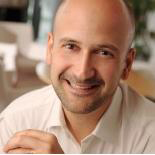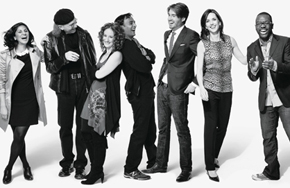
As a marketing director in IBM's Big Data group, Charlie Schick helps scientists and health care providers use computing to pick out meaningful patterns from chaotic-seeming sequencing data or volumes of digital medical records. His resume might suggest he charted a path to get here--an important position in a huge company, working at the bleeding edge of the convergence of biology and computing. But chaos played a big part in Schick's career, too; a nearly unbounded curiosity is the thread that runs through it.
 After college, Schick spent 12 years doing post-graduate research in molecular biology at MIT and Children's Hospital Boston, and teaching as a junior faculty member at Harvard Medical School. He spent another decade working as a tech journalist and doing marketing, product development, and online media at Finnish phone maker Nokia, before returning to the U.S., immersing himself in Boston's DIY bio scene, and ultimately finding a new way to deploy his unique skill set. Here, Schick discusses his atypical career path, and the modern necessity of being a polymath.
After college, Schick spent 12 years doing post-graduate research in molecular biology at MIT and Children's Hospital Boston, and teaching as a junior faculty member at Harvard Medical School. He spent another decade working as a tech journalist and doing marketing, product development, and online media at Finnish phone maker Nokia, before returning to the U.S., immersing himself in Boston's DIY bio scene, and ultimately finding a new way to deploy his unique skill set. Here, Schick discusses his atypical career path, and the modern necessity of being a polymath.
FAST COMPANY: You have a really varied resume. Does that make it easy or hard to sell yourself to an employer?
CHARLIE SCHICK: When I started looking for a way to get back into science, everyone looked at me and said, 'You're a marketing guy, or you're a tech guy.' That's a problem with job-hopping--everyone points to the thing they don't want. Finding this job was total luck. In November 2010, I applied for a digital-media job at a data warehouse appliance company called Netezza, which, I didn't know, was in the process of being acquired by IBM. That job was no longer available, but after the company was became part of IBM, I was contacted about an opening for someone with health care experience to market big-data solutions to health care and life science companies. My group is like a startup inside the company, teaching the greater IBM how to do things. It's a general theme in my career--someplace doesn't have the job I wanted, but they have this other one.
What prompts you to keep mixing things up?
It's partly the wanderlust in my family. My dad was born in Germany and my mom is Brazilian, and they hopped around a lot. The longest my dad worked for someone was six years. That was really unusual for the time. Both my parents are in their 80s now and still moving around. We're all ADHD. I have a really broad interest base. In college and grad school, my advisers always asked me to focus.
I'm not a money chaser--that's usually secondary. I've found as long as do what I love, it will turn out okay. When I was at Nokia, I was really interested in mobile--it was everything I was thinking about. When my interest turned back to science, I started looking for the next thing. Now I can gab about big data, streaming data, all day and still get deep into genomics, science, and medicine. I'm in that zone where it's like, 'I do this for a living?'
About Generation Flux Pioneers of the new (and chaotic) frontier of business Flagship Fluxers, Photo: Brooke Nipar
Flagship Fluxers, Photo: Brooke Nipar
In our February 2012 issue Fast Company Editor Robert Safian identified a diverse set of innovators who embrace instability, tolerate--and even enjoy--recalibrating careers, business models, and assumptions. People like author/Onion digital media maverick Baratunde Thurston, Greylock Data Scientist DJ Patil, Microsoft Senior Researcher danah boyd, and GE's Beth Comstock. This series continues to explore the new values of GenFlux. Find more Fluxers here. And tweet your contributions using #GenFlux.
How'd you go from molecular biology to Nokia?
While I was doing lab work, I volunteered for a science-by-mail program through the Boston Museum of Science, and I started using web tools to interact and talk with kids about science. Around this time, I also started doing some online tech reviews as a way to get free software that I needed for the lab. At the same time, my dad was working in IT and subscribed to a weekly called InfoWorld. I'd borrow those and read everything that people like Bob Metcalfe were writing about the deregulation of telecom in the mid-'90s and what the future of telecom looked like. Inspired by that, I ended up leaving the lab and going to write for a friend who was starting a telecom portal. Leaving an academic lab in my day was absolutely insane. I was doing interesting work, I was publishing research in journals, but this other thing--the idea that everything was going online--really caught my attention.
In 2000, I found out that Nokia was looking for a native English speaker to write documentation for them. I visited their headquarters in Finland and loved it. My first writing job there was a job ad for a marketing person. When I was done, my boss suggested that I take the job. That's how I got into marketing. From there, I got involved in some internal venture challenges, and that led to a proper product-management role.
How has your conception of your career changed over time?
I spend a lot of time thinking about the experience I've been accumulating and looking for a common thread. When I look at my skill set--making products, tech, understanding science--I kind of see myself as a bridge. I'm someone who understands the fundamentals and can translate that into some kind of story, possibly a story that someone wants to buy.
In retrospect, what were some mistakes that you made?
I refuse to have regrets--I'd make the same decisions now--but the part that hurts when you hop around is you lose momentum. Many people I know in science have multiple interests--music or hobbies--but they can stick to one thing in the lab for a long time. I see what you can get if you apply 25 years to same thing. Now I think in terms of 10-year blocks to keep me from chasing every squirrel. Since coming back to U.S., I've also been working on a startup idea called Practical Microbes, to commercialize naturally occurring microorganisms for composting, probiotics, and other useful applications. Throughout my career, I've been motivated by the desire to create something-- whether that's a web service, a new protein, or a new organism--and I don't feel I've created what I want to yet.
How do you incorporate ways of thinking from your earlier work with what you're doing now at IBM?
Even if they don't get into academic research, I think everyone could benefit from what you learn from a science PhD--how to think, do research, ask questions, and set up things to get answers. Scientists see the world very differently. They question everything. When I got into the business world, no one looked at data. I would rip it apart. I was a different from a lot of marketers because I actually wanted to understand how things worked. I had to understand all the technology myself, which meant I could translate it for others.
I've tried to make sure I can think across domains. I ask people to teach me about what they're doing--it may not apply to what I'm doing right now, but it's interesting. My feeling is that moving forward in the job market, people must have a multi-disciplinary background. The idea that you need to have only one skill is going be a killer. Having a broader view and being able to think across domains is going to be key.
No comments:
Post a Comment